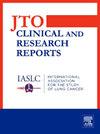鉴定 SCLC 患者的新型基因突变和拷贝数变异
IF 3
Q2 ONCOLOGY
引用次数: 0
摘要
导言:SCLC 传统上被认为是由吸烟等毒性暴露因素引起的。最近的证据显示,种系突变也可能影响SCLC的发展;然而,这些改变仍未得到充分研究。我们试图在我们的患者队列中发现SCLC中的新型种系突变,包括种系拷贝数变异(CNV)。方法我们设计了一个定制的杂交捕获基因面板,以评估SCLC中192个癌症易感基因和频繁突变基因的种系改变。我们对本机构的 67 例未经治疗的 SCLC 患者进行了种系分析。随后,我们使用美国医学遗传学会的标准对变异进行了注释,并使用一套硅学工具(包括 DeepMind AlphaMissense、MutationTaster、SIFT 和 Polyphen2)对意义不确定的变异进行了进一步分类。其中五例(71%)为新型变异(BCORL1、FANCC、ATR和BBC3)和一种新型CNV(SLFN11),两例(29%)为先前描述过的突变(CHEK1和BRIP1)。我们还在67名患者中的60名患者中发现了191个意义不确定的变异,其中5%到14%被预测为致病性变异,具体取决于硅学工具。我们观察到,与其他队列相比,具有 7 个致病性变异的 SCLC 患者的总生存期(危险比 = 0.50)和无进展生存期(危险比 = 0.45)在数字上更长,但无统计学意义。本文章由计算机程序翻译,如有差异,请以英文原文为准。
Identifying Novel Germline Mutations and Copy Number Variations in Patients With SCLC
Introduction
SCLC has traditionally been considered to arise from toxic exposure factors, such as smoking. Recent evidence has revealed that germline mutations may also affect the development of SCLC; however, these alterations remain understudied. We sought to identify novel germline mutations in SCLC including germline copy number variations (CNVs) in our cohort of patients.
Methods
We designed a custom hybrid-capture gene panel to evaluate germline alterations in 192 cancer-predisposition and frequently mutated genes in SCLC. We applied this panel to germline analysis of a treatment-naive cohort of 67 patients with SCLC at our institution. Subsequently, we annotated the variants using the American College of Medical Genetics criteria and further classified variants of uncertain significance using a set of in silico tools, including DeepMind AlphaMissense, MutationTaster, SIFT, and Polyphen2.
Results
We identified American College of Medical Genetics pathogenic or likely pathogenic alterations in seven of 67 patients. Five (71%) were novel alterations (BCORL1, FANCC, ATR, and BBC3) and a novel CNV (SLFN11) with two (29%) previously described mutations (CHEK1 and BRIP1). We also identified 191 variants of uncertain significance in 60 of 67 patients, of which, depending on the in silico tool, 5% to 14% were predicted to be pathogenic. Patients with SCLC with the seven pathogenic alterations were observed to have a numerically longer overall survival (hazard ratio = 0.50) and progression-free survival (hazard ratio = 0.45) though not statistically significant compared with the remaining cohort.
Conclusions
Our study identifies novel germline alterations, including a CNV, and provides additional evidence that germline factors could be important contributing factors to the development of SCLC.
求助全文
通过发布文献求助,成功后即可免费获取论文全文。
去求助
来源期刊

JTO Clinical and Research Reports
Medicine-Oncology
CiteScore
4.20
自引率
0.00%
发文量
145
审稿时长
19 weeks
 求助内容:
求助内容: 应助结果提醒方式:
应助结果提醒方式:


